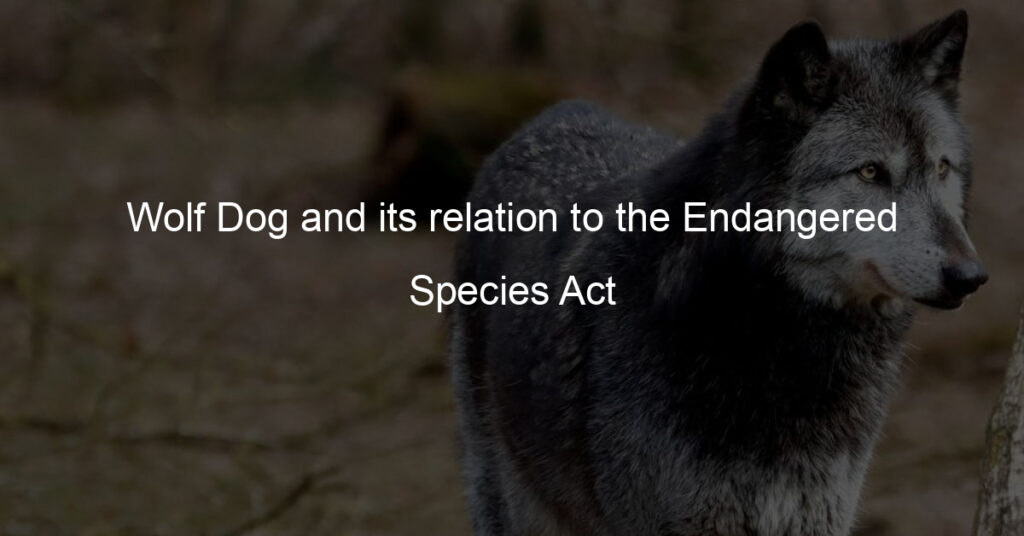Owning a wolf dog can be both awe-inspiring and intimidating. You may have heard of the majestic animal, but what do you know about it? With its roots in the wild, living in captivity demands extra planning and thoughtfulness.
One thing you must consider is how your ownership could affect wolf dogs’ status as an endangered species. To gain insight into this power dynamic, let’s take a deep dive into how owning a wolf dog relates to the Endangered Species Act!
Why is the wolf an endangered species?
The wolf is a species that has been in peril for centuries. Its numbers have decreased due to human activities such as hunting and habitat destruction. In 1973, the Endangered Species Act (ESA) was enacted to protect animals like wolves from extinction. The ESA defines an endangered species as “any species which is in danger of extinction throughout all or a significant portion of its range.”
The wolf is currently listed as an endangered species in the United States, meaning that it is protected under the ESA. As a result, any activities related to owning or transporting wolves are subject to strict regulations and penalties.
What percent of wolf-dog is legal?
Wolves have been bred with domesticated dogs for centuries, creating so-called “wolf dogs.” Depending on which state you live in, these hybrid creatures may or may not be legal to own. Most US states have regulations concerning the maximum amount of wolf allowed in a hybrid, expressed as a percentage – ranging from no wolf content at all to as much as 99% wolf.
States set this limit based on their own opinion about the safety and health risk posed by non-domestic animals, adapting their rules for what is deemed appropriate for their particular areas. This means that if you’re looking to find out what percent wolf dog is legal in your state, it’s best to do some research into local and federal laws first.
Can you keep a wolfdog?
Wolfdogs are fascinating creatures and can make amazing pets for the right owner. Before you take one home though, you need to do some homework – unlike regular dogs, wolfdogs require special care and attention. They have a wild side that can be difficult to handle in a residential setting and commonly shows signs of separation anxiety if left alone too often or for too long.
You must also factor in potential costs; food bills may be larger than an average dog’s as they generally have a large appetite, plus veterinary bills could skyrocket due to the unusual genetics of wolfdogs requiring specialized care. It can be rewarding having such an intriguing animal as a companion on your journey, but always consider all angles before taking the plunge and committing to the responsibility involved.
Are wolfdogs exotic?
Wolfdogs are some of the most fascinating animals in existence, prompting endless debate among animal experts as to whether or not they should be considered exotic. On one hand, they have a wild heritage, showing characteristics that make them similar to wolves. They can have higher intelligence and loyalty levels than other domesticated dogs, but this doesn’t necessarily mean they aren’t fitted to a domestic lifestyle.
Typically wolfdogs tend to get along with people and other animals better than regular wolves, however, the fact remains that their unpredictable nature means there’s always an element of risk associated with having one as a pet. It seems unlikely that the debate as to whether wolfdogs are exotic will ever be definitively settled – it depends on who you ask!
Can wolfdogs be wild?
Wolfdogs, a combination of domestic dog breeds and wild wolves, have become increasingly popular in recent years. But can wolfdogs be truly wild? The answer is complex as it depends on the lineage of the animal, the number of wolf genes that are in its blood, and the environment it is raised and kept.
Not all wolfdogs show wild behaviors and those that do typically do not display them to an extreme. However, even when raised in captivity and properly socialized, these hybrid animals will still have some instinctive wild tendencies that regular domesticated dogs may not have. This can make having a wolfdog as a pet a unique experience but also requires more structured training methods to ensure safety for both owner and animal.
Conclusion: Wolf Dog and its relation to the Endangered Species Act
All in all, while the wolf-dog may not intuitively come to mind when considering endangered species, it is important to understand the impact the Endangered Species Act has on animals like the wolf-dog. The ES Act is a major advantage for these canine hybrid species.
The careful conservation efforts carried out by organizations and scientists are an essential aspect of preserving their existence for generations to come. In addition, education about wolves and dog hybrids can help bring attention to this vulnerable group of animals.
Reaching out to state and private organizations that allow wolf-dog attendants’ education sessions is one-way people can get involved in valuing and protecting wolf dogs as part of our natural environment. When more people understand the delicate nature of wolf dogs’ status in terms of protection provided by lists such as the ESA, we can better equip ourselves with the tools needed to recognize the importance of conserving them – now and in future years.








